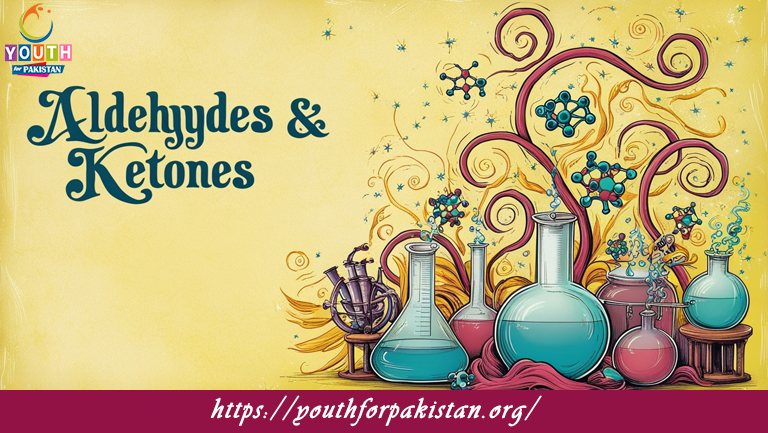Welcome to the Aldehydes & Ketones Preparation MDCAT MCQs with Answers. In this post, we have shared Aldehydes & Ketones Preparation Multiple Choice Questions and Answers for PMC MDCAT 2024. Each question in MDCAT Chemistry offers a chance to enhance your knowledge regarding Aldehydes & Ketones Preparation MCQs in this MDCAT Online Test.
Aldehydes can be prepared by the oxidation of:
a) Primary alcohols
b) Secondary alcohols
c) Tertiary alcohols
d) Ketones
Ketones are commonly prepared by the oxidation of:
a) Primary alcohols
b) Secondary alcohols
c) Tertiary alcohols
d) Aldehydes
The reaction of an alkyl halide with a Grignard reagent produces:
a) Aldehyde
b) Ketone
c) Carboxylic acid
d) Ester
The preparation of aldehydes by the reduction of:
a) Ketones
b) Carboxylic acids
c) Aldehydes
d) Alcohols
Aldehydes can be prepared from alkenes via:
a) Ozonolysis
b) Hydrogenation
c) Halogenation
d) Dehydrogenation
The preparation of ketones from alcohols involves the oxidation of:
a) Primary alcohols
b) Secondary alcohols
c) Tertiary alcohols
d) Aldehydes
The Clemmensen reduction converts:
a) Ketones to alkanes
b) Aldehydes to alkanes
c) Carboxylic acids to aldehydes
d) Aldehydes to carboxylic acids
Ketones can be prepared by the reaction of a:
a) Grignard reagent with a carbonyl compound
b) Aldehyde with an alkyl halide
c) Primary amine with a ketone
d) Secondary amine with an aldehyde
Aldehydes are prepared from carboxylic acids via:
a) Reduction with LiAlH₄
b) Oxidation
c) Halogenation
d) Esterification
The reaction of an alkyl halide with a metal catalyst in the presence of a reducing agent can prepare:
a) Ketones
b) Aldehydes
c) Alcohols
d) Carboxylic acids
The preparation of aldehydes from alkanes can be achieved by:
a) Ozonolysis
b) Hydrolysis
c) Dehydrogenation
d) Hydrogenation
The reaction of a primary alcohol with chromic acid produces:
a) Ketone
b) Aldehyde
c) Carboxylic acid
d) Ester
The oxidation of a primary alcohol to an aldehyde can be carried out using:
a) PCC (Pyridinium chlorochromate)
b) NaBH₄
c) LiAlH₄
d) H₂SO₄
Ketones can be prepared from the reaction of an alkyl halide with:
a) Grignard reagent
b) Sodium bisulphite
c) Sodium hydroxide
d) Hydrogen chloride
The preparation of aldehydes via hydrolysis involves:
a) Nitriles
b) Alkyl halides
c) Carboxylic acids
d) Esters
The reduction of carboxylic acids to aldehydes can be achieved using:
a) LiAlH₄
b) NaBH₄
c) Zinc amalgam
d) H₂SO₄
The reaction of an aldehyde with a primary amine produces:
a) Imine
b) Amide
c) Alcohol
d) Ester
Ketones can be prepared by the reaction of:
a) Aldehydes with Grignard reagents
b) Carboxylic acids with LiAlH₄
c) Alcohols with PCC
d) Alkanes with ozone
Aldehydes can be prepared by the dehydrogenation of:
a) Alcohols
b) Ketones
c) Carboxylic acids
d) Esters
The reaction of an aldehyde with sodium bisulphite forms:
a) Bisulphite addition compound
b) Aldol
c) Imine
d) Carboxylic acid
The formation of ketones from the reaction of:
a) Aldehydes with Grignard reagents
b) Alcohols with HCl
c) Nitriles with water
d) Esters with alcohol
The preparation of aldehydes from nitriles involves:
a) Reduction
b) Oxidation
c) Hydrolysis
d) Dehydration
Aldehydes can be synthesized from:
a) Ozonolysis of alkenes
b) Hydrolysis of esters
c) Reduction of ketones
d) Oxidation of secondary alcohols
Ketones can be prepared by the reaction of:
a) Secondary alcohols with oxidizing agents
b) Primary alcohols with oxidizing agents
c) Aldehydes with sodium bisulphite
d) Carboxylic acids with LiAlH₄
The formation of aldehydes by the reduction of:
a) Carboxylic acids
b) Ketones
c) Nitriles
d) Alkyl halides
Ketones can be prepared by the reaction of:
a) Aldehydes with Grignard reagents
b) Carboxylic acids with alcohols
c) Alkanes with ozone
d) Aldehydes with sodium bisulphite
The reduction of aldehydes to primary alcohols is carried out using:
a) LiAlH₄
b) NaOH
c) PCC
d) H₂SO₄
The preparation of ketones from secondary alcohols is achieved by:
a) Oxidation
b) Reduction
c) Hydrolysis
d) Dehydration
Aldehydes can be synthesized by the:
a) Hydrolysis of nitriles
b) Dehydrogenation of alcohols
c) Oxidation of ketones
d) Reduction of carboxylic acids
The preparation of ketones by the reaction of:
a) Grignard reagents with carboxylic acids
b) Aldehydes with alcohols
c) Primary alcohols with oxidizing agents
d) Secondary alcohols with oxidizing agents
Aldehydes can be prepared by:
a) Oxidation of primary alcohols
b) Reduction of secondary alcohols
c) Hydrolysis of ketones
d) Dehydrogenation of esters
The preparation of ketones from carboxylic acids involves:
a) Reduction
b) Oxidation
c) Esterification
d) Grignard reaction
Aldehydes can be synthesized using:
a) Ozonolysis of alkenes
b) Hydrogenation of ketones
c) Hydrolysis of nitriles
d) Oxidation of tertiary alcohols
The reaction of an alkyl halide with a Grignard reagent in the presence of:
a) Carbon dioxide
b) Alcohol
c) Water
d) Sodium hydroxide
The reduction of aldehydes to primary alcohols can be done using:
a) NaBH₄
b) PCC
c) LiAlH₄
d) H₂SO₄
The reaction of ketones with primary amines results in:
a) Imine formation
b) Aldol condensation
c) Esterification
d) Oxidation
The oxidation of secondary alcohols yields:
a) Ketones
b) Aldehydes
c) Carboxylic acids
d) Alcohols
Aldehydes can be prepared by:
a) Hydrolysis of esters
b) Reduction of ketones
c) Oxidation of secondary alcohols
d) Dehydration of primary alcohols
The reaction of a nitrile with a reducing agent produces:
a) Aldehyde
b) Ketone
c) Carboxylic acid
d) Ester
The preparation of aldehydes using:
a) Reduction of nitriles
b) Oxidation of ketones
c) Hydrolysis of carboxylic acids
d) Dehydrogenation of secondary alcohols
If you are interested to enhance your knowledge regarding Physics, Chemistry, Computer, and Biology please click on the link of each category, you will be redirected to dedicated website for each category.








